|
|
|
Sort Order |
|
|
|
Items / Page
|
|
|
|
|
|
|
| Srl | Item |
| 1 |
ID:
141385
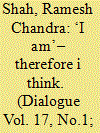

|
|
|
|
|
| Summary/Abstract |
The unprecedented explosion of knowledge in all fields on the one hand, and the virtual magic of I.T. revolution on the other would appear to have changed everything in our life-world. Most of us remnants of the older generation feel somewhat dazed and challenged by the new dispensation, replacing knowledge by knowledge-industry; books by ebooks; & education by the new-fangled phrase human resources. Management is the key word now: management gurus preside over all developments of culture today – rendering not only pure intellectuals, but even what was once called sage-mind irrelevant and superfluous. How with this rage shall Beauty or even what a great twentieth century poet called ‘The commonsense of the soul,’ hold a plea?
|
|
|
|
|
|
|
|
|
|
|
|
|
|
|
|
| 2 |
ID:
168565
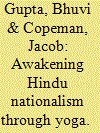

|
|
|
|
|
| Summary/Abstract |
Alongside Prime Minister Narendra Modi, whose politics he explicitly endorses, Swami Ramdev is frequently depicted as the contemporary face of neo-Hindutva nationalism in India. This essay concerns specific, but interrelated, aspects of the Swami Ramdev ‘phenomenon’ and their particular relation to Hindu nationalism. We bracket the headline-stealing anti-Islamic and pro-Modi proclamations in order to focus on the nuances of the relationship between his yoga and a majoritarian Hindutva agenda and examine the specifics of Ramdev’s teachings and campaigns. We suggest that the (Hindu) nationalism of Ramdev and his organisations is formed less of propositional or even affective content but instead is a condition emerging from its particular prescription and practice of yoga; it is a condition of the body. In this way, yoga, as it is reproduced at the site of the individual body, produces the national(ist) activist subject.
|
|
|
|
|
|
|
|
|
|
|
|
|
|
|
|
| 3 |
ID:
153017
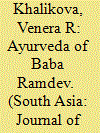

|
|
|
|
|
| Summary/Abstract |
This paper examines a cultural politics of nationalism and alternative medicine in India. It investigates the rhetoric of a popular guru, Ramdev, who criticises ‘the West’ and promotes ‘homegrown’ yoga and Ayurveda for strengthening individual bodies and the body of the nation. I argue that the expansion of the Ayurvedic market in India and Ramdev's personal success are both based on discourses that interweave a neo-liberal quest for health with nationalist sentiments and consumerist desires. I show how yoga and Ayurveda—situated within narratives of citizens’ duty to consume the homegrown—have become political tokens of national belonging and biomoral consumerism.
|
|
|
|
|
|
|
|
|
|
|
|
|
|
|
|
| 4 |
ID:
161284
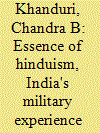

|
|
|
|
|
| Publication |
Dehradun, Greenfields Publishers, 2018.
|
| Description |
x, 404p.hbk
|
| Standard Number |
9789381089354
|
|
|
|
|
|
|
|
|
|
|
|
Copies: C:1/I:0,R:0,Q:0
Circulation
| Accession# | Call# | Current Location | Status | Policy | Location |
| 059518 | 355.4754/KHA 059518 | Main | On Shelf | General | |
|
|
|
|
| 5 |
ID:
160676
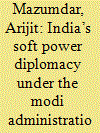

|
|
|
|
|
| Summary/Abstract |
This paper examines the Narendra Modi administration's use of three specific soft power assets of India – Buddhism, Diaspora, and Yoga – in diplomacy in service of the country's national interests. It attempts to address the following questions: What is the main purpose of the Modi administration's soft power strategy and the reasons behind the promotion and utilization of these three assets? What are the impediments to India's soft power projection ability? Finally, how can the Modi administration better exploit India's soft power advantages? This paper demonstrates how the Modi administration is making efforts to project India's soft power in the service of larger strategic goals. The use of soft power is designed to complement India's conventional diplomacy, boost its international image, project it as a peaceful rising power, improve relations with other countries, and help attract foreign investment, technology, and tourists in order to promote economic growth and development.
|
|
|
|
|
|
|
|
|
|
|
|
|
|
|
|
| 6 |
ID:
165237


|
|
|
|
|
| Summary/Abstract |
This article is a preliminary attempt to understand the dynamics of how Patanjali and Baba Ramdev represent ‘Hindu nationalism’, or Hindutva (Hinduness) in Nagaland, India. One can read Baba Ramdev's foray into the region through the promotion of yoga, Ayurveda, and national health, as a form of ‘neo-Hindutva’ that is increasingly diffuse and moves away from a more militant pathway of established Hindutva designs. If one considers the work of Patanjali in Nagaland as an attempt to homogenise and unify a set of practices surrounding food and health practices, then, one can read this as an attempt to assert a singular somatic imagination, increasingly influenced by Hindutva ideas about the body, ‘the health of the nation’, and the promotion of swadeshi (indigenous goods) as patriotic duty. This article highlights the way Ramdev and Patanjali's business empire is trying to move beyond the ‘cow belt’ of north India, comprising mainly of ‘Hindu-Hindi’ into regions that are more diverse linguistically and historically, and culturally viewed as ‘un-Indian’.
|
|
|
|
|
|
|
|
|
|
|
|
|
|
|
|
| 7 |
ID:
102039
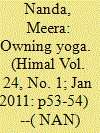

|
|
|
| 8 |
ID:
114017
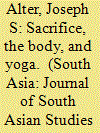

|
|
|
|
|
| Publication |
2012.
|
| Summary/Abstract |
In most general terms, hathayoga involves the internalisation and embodied literalisation of the Vedic fire sacrifice. Reflecting on the place of sacrifice in anthropological theory, and on the way in which sacrifice structures the relationship between humans and gods in terms of gift obligations, this paper explores the theoretical implications of hathayoga's embodied literalisation of a profoundly symbolic act. Although similar to various forms of ascetic renunciation, hathayoga is unique, it will be argued, in being structured as the physiological antithesis of religious ritual. Self-realisation based on the internalised yajna sacrifice undermines the binary structure of the sacred and the profane and makes god irrelevant. This raises theoretical questions concerning the social significance of a ritual that is anti-social on a number of different levels.
|
|
|
|
|
|
|
|
|
|
|
|
|
|
|
|
| 9 |
ID:
191699


|
|
|
|
|
| Summary/Abstract |
This essay investigates competing visibilities within a cultural practice that India has promoted as a privileged image of national identity: yoga. These competing perceptions, in which yoga can be seen as at once iconically and yet not uniquely Indian, pose a challenge for the Indian state in its management of yoga’s symbolic value. Analysing rhetoric from India’s nation-branding pursuits in the context of Western popular culture, I argue that the state manipulates visual regimes of yoga in ways that turn this spectre of Indian invisibility into a testament to Indian ubiquity. Invisibility as a problem is thus transformed into invisibility as a privilege, revealing how the potential fluidity across two different regimes of identity and power can render state fantasies more resilient.
|
|
|
|
|
|
|
|
|
|
|
|
|
|
|
|
| 10 |
ID:
180278
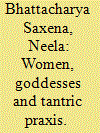

|
|
|
|
|
| Summary/Abstract |
While modern India is complex, plural and perhaps foundationally connected with its rich liberatory paths, there is reason to be concerned when a large number of people are fed hate-filled rhetoric against their own long-term neighbors. Today the virulent ideology of a purported “Hindu” rashtra is growing under governmental provocation. It needs an alternative vision which can be resurrected from India's own suppressed history. That is Tantric India, whose liberatory paths with women and goddesses is compatible with the contemporary world. India has been a magnet for “spiritual” seekers around the world because the great sages were helping to free us from our conditioned selves. This worldview, that encompassed all Indic dharmas, was developed especially by Shaiva, Shakta and Buddhist enlightened beings, and was set against an upper caste hegemony of truncated Vedism. The true masters who developed a real science of tantric praxis taught how to appreciate the world here and now without violence to the self, earth or the perceived other. From ancient yogic explorations of humanistic psycho-spiritual development that has been a hallmark of India, a profoundly egalitarian world view had developed during 8th through 12th centuries. It is time we reexamine that history and imagine a different Subcontinent.
|
|
|
|
|
|
|
|
|
|
|
|
|
|
|
|
| 11 |
ID:
171862
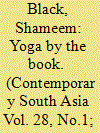

|
|
|
|
|
| Summary/Abstract |
This essay analyses the cultural politics of yoga through a literary history of its twentieth- and twenty-first-century connection to books. The midcentury instruction manual for postural yoga, exemplified by B.K.S. Iyengar’s Light on Yoga, created a postcolonial literary genre that aimed to resolve particular tensions within the structure of Indian identity in a globalizing world. This genre has influenced the rise of twenty-first-century yoga fiction in Western popular culture in English. Ironically, such fiction also works against ideals of globalized Indianness projected through Iyengar’s manual. Through this exploration of yoga in print culture, this essay argues that the cultural instruction performed through writing is not just about yoga, but part and parcel of yoga itself.
|
|
|
|
|
|
|
|
|
|
|
|
|
|
|
|
|
|
|
|
|